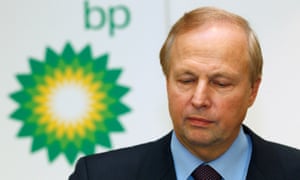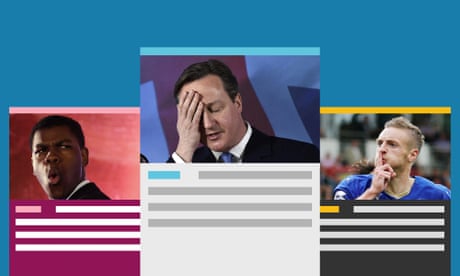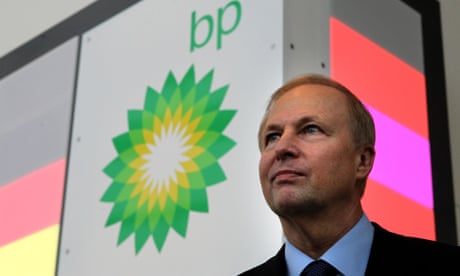Non-binding vote shows almost 60% of shareholders disapprove of deal, one of the biggest AGM revolts against executive pay
 BP’s chief executive, Bob Dudley. Photograph: Reuters
BP’s chief executive, Bob Dudley. Photograph: Reuters
Terry Macalister, Jill Treanorand Sean Farrell
Thursday 14 April 2016 19.55 BSTLast modified on Friday 15 April 201601.05 BST
Britain’s top bosses were sent a warning on Thursday that they must rein in boardroom excess when shareholders voted overwhelmingly against huge pay deals at two of Britain’s biggest companies.
Almost 60% of shareholders voted against a £14m pay package for the chief executive of BP in a year in which it reported record losses, cut thousands of jobs and froze its employees’ pay.
Just hours later, more than 50% of investors voted against pay deals at the medical equipment group Smith & Nephew, in a rare display of shareholders demonstrating their unwillingness to tolerate boardroom excess.
After scenes recalling the 2012 “shareholder spring” when several major companies faced rebellions over pay, the Institute of Directors said companies must respond to shareholders’ anger or risk discrediting the wider business community.
“British boards are now in the last chance saloon. If the will of shareholders in cases like this is ignored, it will only be a matter of time before the government introduces tougher regulations on executive pay,” said Simon Walker, the IoD’s director general.
Stefan Stern, the director of the High Pay Centre, said this year’s rebellions felt more substantial than the revolts of 2012. “We are reaching a point where the largest CEO packages represent a material issue for shareholders that is big enough to require serious consideration. We could be reaching a point where more shareholders will argue that it is too damaging to businesses’ own interests to allow top pay to rise this high,” he said.

The stories you need to read, in one handy email
Read more
The rebellions kickstarted the annual general meeting season during which most FTSE 100 companies will hold audiences with their shareholders, big and small. Investors said company bosses would be on their guard for further standoffs.
The 60% vote against the £14m payout to BP’s chief executive, Bob Dudley, was the second biggest rebellion of its kind at a large company, according to data compiled by the shareholder advisory group Manifest.
Some 59.29% opposed the remuneration report, a rebellion that has only ever been exceeded by one at Royal Bank of Scotland (RBS) in 2009 at the height of the banking crisis, when 80.1% voted against, and surpassing the 59% that voted against the £6.8m pay deal for Sir Martin Sorrell at his advertising company WPPin 2012.
The results of the vote on BP pay were revealed by the company at its annual meeting in London and followed a barrage of criticism from shareholders who accused executives of living in a parallel universe of privilege.
The huge payout in cash, shares and pension contributions to Dudley and other board members came during a year when the company ran up its largest ever losses of $6.5bn due to a collapse in oil prices and huge fines for the Deepwater Horizon accident in 2011.
At the ExCel conference centre in London organisations and an army of small shareholders stepped up to lambast the board in person for rewarding themselves so inappropriately – as well as to ask why it was continuing to invest heavily in fossil fuels after promising to take climate change into account in all its operations.
The Church of England pension board questioned “whether this level [of pay] is morally right” and went on to ask how much one individual executive needed to be incentivised to make him work.
One small shareholder, who introduced himself as Captain Hawker, said BP had stepped into a “PR nightmare” by handing out such largesse when the rest of the country was mired in austerity.
BP’s chairman, Carl-Henric Svanberg, told the meeting that the board would listen to shareholders’ views while the chair of the company’s remuneration committee promised to review its executive pay structure.
“Let me be clear. We hear you. We will sit down with our largest shareholders to make sure we understand their concerns and return to seek your support for a renewed policy,” Svanberg said.
Some 59.29 % had opposed the remuneration report, a rebellion only exceeded by one at Royal Bank of Scotland (RBS) at the height of the banking crisis, and surpassing the 59% that voted against the £6.8m pay deal for Sir Martin Sorrell at his advertising company WPP in 2012.
Manifest compared it to other revolts including by 54% of Aviva shareholders in 2012 and by 57.1% of Royal Dutch Shell investors in 2009.

BP boss faces shareholders angry at £13.8m pay deal
Read more
Ann Dowling, the chair of BP’s remuneration committee, attempted to answer the criticism and promised she would come back next year with a new formula for assessing pay.
She defended the general level of pay at BP, saying it was “somewhere in the middle” of what other companies of a similar nature paid. “We have to reward people appropriately to attract the talented employees who are important for the future health of the company,” she said.
But a number of politicians and commentators including Vince Cable, the former business secretary, and Barry Sheerman, the Labour MP for Huddersfield, believed Dudley, Dowling or others should lose their jobs over the fiasco.
After the meeting, Legal & General’s fund management arm – one of the biggest investors in the City – said it had voted against the pay deal. Ashley Hamilton Claxton, the corporate governance manager at Royal London Asset Management, said the board should now consider the views of shareholders.
Hopes, however, were low. Roger Lawson, the deputy chairman of ShareSoc, the group of small shareholders that opposed Dudley’s pay, said: “In my experience the concessions you get after a company loses a remuneration vote are not very large. They say: ‘We’ve listened to shareholders and changed this and that’ and hope they can squeak it through next year.”
At Smith & Nephew, investors were angered by a decision to allow a long-term incentive plan to pay out £2.1m to 60 senior executives even though the performance criteria had not been reached.
S&N said: “We recognise that the use of discretion is a matter where there is considerable divergence of opinion. In spite of the voting outcome, the board unanimously believe that in these particular circumstances the remuneration committee made the right decision in aligning executive reward to the shareholder experience.”
 BP’s chief executive, Bob Dudley. Photograph: Reuters
BP’s chief executive, Bob Dudley. Photograph: ReutersTerry Macalister, Jill Treanorand Sean Farrell
Thursday 14 April 2016 19.55 BSTLast modified on Friday 15 April 201601.05 BST
Britain’s top bosses were sent a warning on Thursday that they must rein in boardroom excess when shareholders voted overwhelmingly against huge pay deals at two of Britain’s biggest companies.
Almost 60% of shareholders voted against a £14m pay package for the chief executive of BP in a year in which it reported record losses, cut thousands of jobs and froze its employees’ pay.
Just hours later, more than 50% of investors voted against pay deals at the medical equipment group Smith & Nephew, in a rare display of shareholders demonstrating their unwillingness to tolerate boardroom excess.
After scenes recalling the 2012 “shareholder spring” when several major companies faced rebellions over pay, the Institute of Directors said companies must respond to shareholders’ anger or risk discrediting the wider business community.
“British boards are now in the last chance saloon. If the will of shareholders in cases like this is ignored, it will only be a matter of time before the government introduces tougher regulations on executive pay,” said Simon Walker, the IoD’s director general.
Stefan Stern, the director of the High Pay Centre, said this year’s rebellions felt more substantial than the revolts of 2012. “We are reaching a point where the largest CEO packages represent a material issue for shareholders that is big enough to require serious consideration. We could be reaching a point where more shareholders will argue that it is too damaging to businesses’ own interests to allow top pay to rise this high,” he said.

The stories you need to read, in one handy email
Read more
The rebellions kickstarted the annual general meeting season during which most FTSE 100 companies will hold audiences with their shareholders, big and small. Investors said company bosses would be on their guard for further standoffs.
The 60% vote against the £14m payout to BP’s chief executive, Bob Dudley, was the second biggest rebellion of its kind at a large company, according to data compiled by the shareholder advisory group Manifest.
Some 59.29% opposed the remuneration report, a rebellion that has only ever been exceeded by one at Royal Bank of Scotland (RBS) in 2009 at the height of the banking crisis, when 80.1% voted against, and surpassing the 59% that voted against the £6.8m pay deal for Sir Martin Sorrell at his advertising company WPPin 2012.
The results of the vote on BP pay were revealed by the company at its annual meeting in London and followed a barrage of criticism from shareholders who accused executives of living in a parallel universe of privilege.
The huge payout in cash, shares and pension contributions to Dudley and other board members came during a year when the company ran up its largest ever losses of $6.5bn due to a collapse in oil prices and huge fines for the Deepwater Horizon accident in 2011.
At the ExCel conference centre in London organisations and an army of small shareholders stepped up to lambast the board in person for rewarding themselves so inappropriately – as well as to ask why it was continuing to invest heavily in fossil fuels after promising to take climate change into account in all its operations.
The Church of England pension board questioned “whether this level [of pay] is morally right” and went on to ask how much one individual executive needed to be incentivised to make him work.
One small shareholder, who introduced himself as Captain Hawker, said BP had stepped into a “PR nightmare” by handing out such largesse when the rest of the country was mired in austerity.
BP’s chairman, Carl-Henric Svanberg, told the meeting that the board would listen to shareholders’ views while the chair of the company’s remuneration committee promised to review its executive pay structure.
“Let me be clear. We hear you. We will sit down with our largest shareholders to make sure we understand their concerns and return to seek your support for a renewed policy,” Svanberg said.
Some 59.29 % had opposed the remuneration report, a rebellion only exceeded by one at Royal Bank of Scotland (RBS) at the height of the banking crisis, and surpassing the 59% that voted against the £6.8m pay deal for Sir Martin Sorrell at his advertising company WPP in 2012.
Manifest compared it to other revolts including by 54% of Aviva shareholders in 2012 and by 57.1% of Royal Dutch Shell investors in 2009.

BP boss faces shareholders angry at £13.8m pay deal
Read more
Ann Dowling, the chair of BP’s remuneration committee, attempted to answer the criticism and promised she would come back next year with a new formula for assessing pay.
She defended the general level of pay at BP, saying it was “somewhere in the middle” of what other companies of a similar nature paid. “We have to reward people appropriately to attract the talented employees who are important for the future health of the company,” she said.
But a number of politicians and commentators including Vince Cable, the former business secretary, and Barry Sheerman, the Labour MP for Huddersfield, believed Dudley, Dowling or others should lose their jobs over the fiasco.
After the meeting, Legal & General’s fund management arm – one of the biggest investors in the City – said it had voted against the pay deal. Ashley Hamilton Claxton, the corporate governance manager at Royal London Asset Management, said the board should now consider the views of shareholders.
Hopes, however, were low. Roger Lawson, the deputy chairman of ShareSoc, the group of small shareholders that opposed Dudley’s pay, said: “In my experience the concessions you get after a company loses a remuneration vote are not very large. They say: ‘We’ve listened to shareholders and changed this and that’ and hope they can squeak it through next year.”
At Smith & Nephew, investors were angered by a decision to allow a long-term incentive plan to pay out £2.1m to 60 senior executives even though the performance criteria had not been reached.
S&N said: “We recognise that the use of discretion is a matter where there is considerable divergence of opinion. In spite of the voting outcome, the board unanimously believe that in these particular circumstances the remuneration committee made the right decision in aligning executive reward to the shareholder experience.”









0 коммент.:
Post a Comment